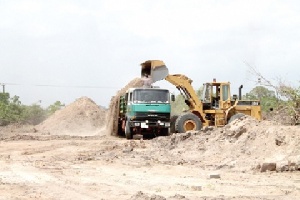 The Minerals Commission attributed this state of affairs to inadequate staff and logistics
The Minerals Commission attributed this state of affairs to inadequate staff and logistics
Eighty five percent of sand winners in the country are operating illegally, a Parliamentary report has revealed.
According to the report, the Minerals Commission has not performed its responsibilities under the law satisfactorily.
The Commission attributed this state of affairs to inadequate staff, logistics and lack of cooperation from the other relevant regulatory bodies.
Though some District Assemblies have established taskforces to combat the menace, the illegal sand winners operate at night and are armed with deadly weapons thereby making it difficult for the commission to apprehend them,the report captured.
Furthermore, officials of the Environmental Protection Agency, EPA, attributed the widespread of illegal operations to low penalty regime for offenders.
The prescribed penalty for sand winning offences under Regulation 29 of the Legislative Instrument (L.I) 1652 is Gh₵200.
Another observation made by the report was the cumbersome procedure and the duration within which a prospective sand winner has to go through to secure a licence to operate.
By the Minerals and Mining Act, 2006 and the Environmental Assessment Regulations, the maximum duration for the issuance of license is about 11 months, however the report gathered that in practice, it takes over two years to acquire a license.
These revelations came to the fore when the Speaker of Parliament, set up a committee to investigate the activities of sand winning in the country, following a statement on the effects of the activities on the floor of Parliament by the Member of Parliament for Nsawam Adoagyiri.
The terms of reference for the Committee were to examine the adequacy of the existing legal framework regulating sand winning in the country, assess the capacity and effectiveness of the existing institutions responsible for regulating sand winning in the country, assess the impact of sand winning in the country and make recommendations to the House on the way forward.
The impact of sand winning on the environment has been on the increase from the past decade or so due to the high demand in the building and construction sector of the economy. The need to reduce the housing deficit and industrial constructions among others has led to this phenomenon.
The negative impact among others ranges from destruction of arable lands, food and cash crop, obstruction of river transport and decline in fish stocks, threat to public safety and upsurge of conflicts due to abandoned pits after winning the sand as well as threat of coastal erosion.
Chairman of the Committee, Frank Annoh-Dompreh also bemoaned the lack of coordination among the various regulatory bodies such as the Minerals Commission, Environmental Protection Agency (EPA), District Assemblies, Security Agencies, Water Resources Commission and Traditional Authorities.
For instance, the coordination between the EPA, Water Resource Commission and Minerals Commission ends just after issuing the licences to a sand winner; no mechanism exists to collaborate with the District Assemblies and the Security Officers to monitor the operations of the sand winners.
Among the Committees recommendations include getting the Minister responsible for mining to submit a bill to Parliament to amend the Minerals and Mining Act, 2006(Act703) to provide for a more decentralised system of license acquisition for sand winning, establishment of a taskforce consisting of Security Officers, representatives from the District Assemblies, EPA, Minerals Commission and where necessary Water Resources Commission at District Levels.
The committee also recommends that considering the differences in requirements for sand winning in water as oppose to land, the Committee recommends that as a matter of urgency, the Water Resources Commission should collaborate with EPA to develop unique guidelines for sand winning in water bodies.
In Ghana, the Mining and Minerals Act (Act 703), regulates the activities of stone and sand winners.
It classifies sand and stone as major minerals and therefore subjects them to the same process of obtaining permits as it is done in the case of those who mine gold, diamond, bauxite and other precious minerals.